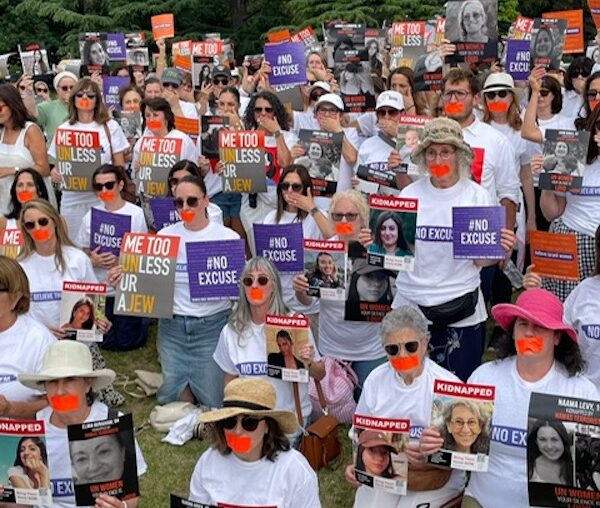If we don’t give voice to the victims of rape during the Holocaust then who will? I asked my tour guide at the Yad Vashem Holocaust History Museum in Jerusalem this summer. Yes but we must also consider the privacy and dignity of these women, he responded.
We were standing in front of a small but mighty exhibit of Jewish female victims of rape in the Holocaust. There were a few panels with text and black-and-white images of women stripped of clothing at the end of the museum tucked into a corner.
Although we debated how to tell stories of rape victims, and even if they are our stories to tell, in a post Oct 7 world where Jewish feminists fight the silence of feminist organisations like UNwomen, facing rape as a weapon of war is the only way forward.
Jonathan Yoni Berrous, Director of the International School for Holocaust Studies at Yad Vashem, wasn’t only my tour guide, but also my seminar leader on a program for teachers by the Canadian Society for Yad Vashem. It was my first time in Israel since 2004, so this was also the first time I saw the museum since its renovation in 2005.
The topic may not have been as cut and dry this summer, but in the same way, the harsh reality of the sexual violence against Israeli women at the hands of Hamas terrorists on Oct 7 informs Israeli society, it must also inform the way the international society copes with sexual violence against women in wartime.
During 16 days of activism to mark UNwomen’s International Day for the Elimination of Violence Against Women, we must ask the hard questions about the intersectionality of feminism like Jewish feminists like myself have been forced to do.
Since feminist organisations like UNwomen, have failed Israeli women by speaking out too late, retracting statements, and blurring the lines between the victim and the aggressor, Jewish organisations have spearheaded campaigns driven by hashtags like “Believe Israeli Women” and “Me Too Unless Ur A Jew.”
Now more than ever we can see that rape as a weapon of war can’t be confined to the margins of a textbook or a corner of a museum.
Now more than ever “Her” story is vital to the collective healing of sexual violence of Israeli women, children, babies, and men at the hands of Hamas terrorists.
Now more than ever “Her” story is vital to the collective healing of sexual violence of all women, children, babies, and men in times of war.
The rape survivors need us: we must not protect the abuser.
Women’s sexual violence stories in wartime must be told in the museums of the world like the Yad Vashem Holocaust History Museum and not be restricted to a corner.
Women’s sexual violence stories must be central to textbooks and not just a footnote.
Women’s stories must be part of today’s collective consciousness when we speak about the violence of Oct 7 against innocent Israeli civilians.
Facing the harsh reality of rape as a weapon of war is the only way forward.
There is no room for the victim blaming of innocent Israeli citizens. There is no room for victim blaming of female victims of sexual violence. It’s not just an afterthought. It’s not just something that happened too. Because “Me Too” means Me Too for everyone.
This week in my grade 12 English class we discussed Lawrence Hill’s The Book of Negroes. One student expressed her fondness for the book being narrated by Aminata, a female slave, which allowed the author to centre the impact of slavery on women.
Except, she added that only women were victims of sexual violence, so slavery was harsher for women. That’s when a Black male student corrected her by saying that men were also victims of sexual exploitation.
I intervened and made it clear that deciding who has it worse is never positive and only trivialises societal issues. My students knew that comparing men and women in the slave trade was disingenuous and divisive.
Why doesn’t the world know that comparing the plight of innocent Israeli citizens to innocent Palestinian citizens is counterproductive?
Why doesn’t the world know that minimising, denying, and revising the sexual violence that Israeli women experience in a post-Oct 7 world is wrong? Believe Israeli Women.
Support Israeli Women by signing B’nai Brith Canada’s campaign to “End Hamas Terror” to condemn those who deny and those who are silent about Hamas’ violence against women.

